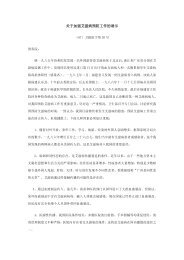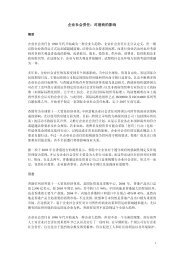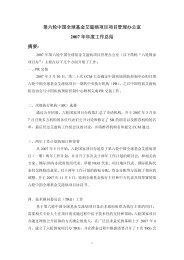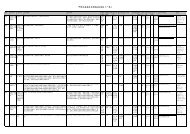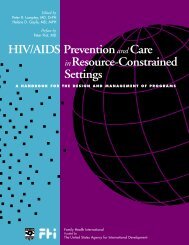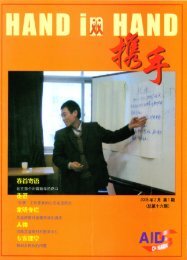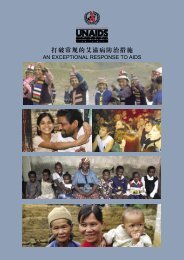The Training of Trainers Manual - UNFPA
The Training of Trainers Manual - UNFPA
The Training of Trainers Manual - UNFPA
Create successful ePaper yourself
Turn your PDF publications into a flip-book with our unique Google optimized e-Paper software.
training or when supervising peer educators in their field work − the trainer<br />
should be capable <strong>of</strong> responding adequately.<br />
■ Exploration <strong>of</strong> personal values about the health issues being addressed,<br />
including attitudes towards gender-based norms and biases. <strong>Trainers</strong> <strong>of</strong><br />
trainers must recognize their own values and biases so they can help the<br />
trainees begin to understand their own. It is difficult to lead a group through a<br />
process <strong>of</strong> self-awareness without having already done this same work oneself.<br />
■ Methodologies for skills building, such as role play. Building skills is an<br />
essential part <strong>of</strong> peer education. A good peer education programme will<br />
include role plays and other theatre-based techniques as an approach to<br />
developing skills. However, delivering constructive, believable theatre and role<br />
plays requires some training.<br />
■ Communication and group-work skills. Facilitating a training course and<br />
working interactively with a group <strong>of</strong> trainees requires a thorough knowledge<br />
<strong>of</strong> communication techniques. Future trainers must be able to serve as a model<br />
for communication and group work, since the best training is conducted by<br />
example.<br />
■ Basic guidelines for planning, implementing, monitoring, and evaluating<br />
peer education programmes. Planning and implementing a peer education<br />
programme is not just the responsibility <strong>of</strong> the project manager. It is essential<br />
that all those involved in the programme, including the trainer and the peer<br />
educators, have a basic understanding <strong>of</strong> processes such as needs assessment<br />
or monitoring and evaluation. Future trainers also need solid guidelines on how<br />
to select, supervise, and support peer educators.<br />
■ Strategies for outreach to vulnerable young people. Peer education can be<br />
used either as an educational approach among mainstream youth or as an<br />
outreach approach to reach groups <strong>of</strong> especially vulnerable young people.<br />
Future trainers <strong>of</strong> trainers need to be able to inform the trainees about the<br />
challenges <strong>of</strong> reaching vulnerable populations (legal, ethical, and logistical<br />
issues) and specific techniques for working with them.<br />
■ Information about peer education resources. <strong>Trainers</strong> need to be familiar<br />
with resources that can complement their knowledge <strong>of</strong> peer education, such<br />
as peer education training guides, textbooks on peer education and behaviour<br />
change, and resources on content areas <strong>of</strong> peer education (e.g., reproductive<br />
health, STIs and HIV/AIDS, or information on drugs). A TOT workshop should<br />
<strong>of</strong>fer opportunities to explore these resources.<br />
■ Information about youth health services. Peer education programmes do<br />
not operate in a vacuum, but instead are components <strong>of</strong> a larger framework<br />
<strong>of</strong> resources. <strong>Trainers</strong> should be aware <strong>of</strong> the clinics, information sources,<br />
pharmacies, and supportive services available in their area and should include<br />
this information as part <strong>of</strong> a comprehensive peer education programme. <strong>The</strong>y<br />
24 <strong>Training</strong> <strong>of</strong> <strong>Trainers</strong> <strong>Manual</strong>



